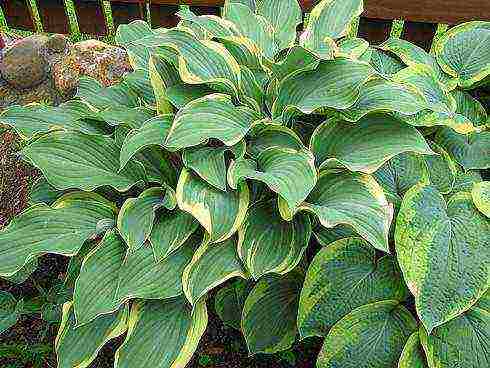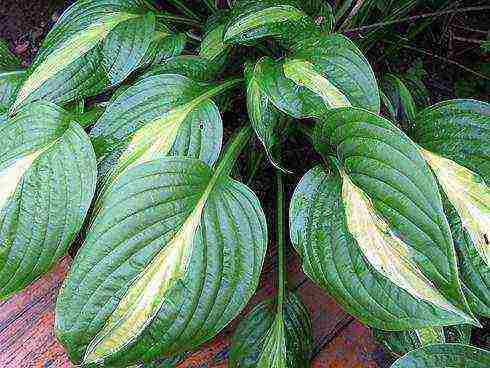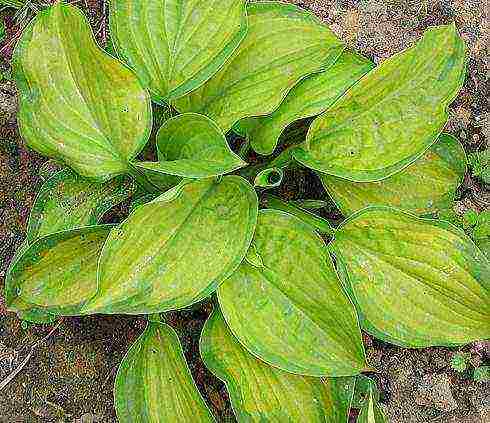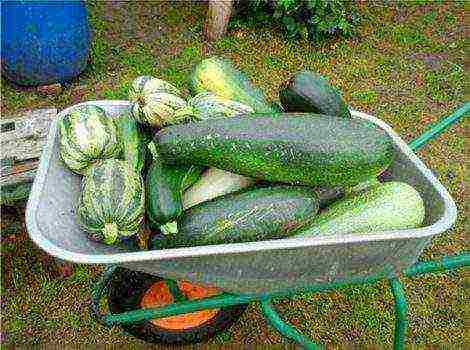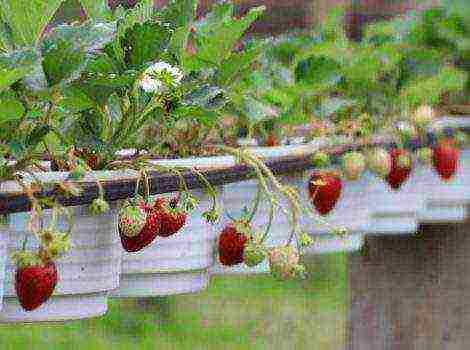Content
Hosta is an irreplaceable ornamental plant for shady areas of the garden. These perennials are ideal for growing in curbs and mixborders, at the foot of alpine slides and in tree trunks.
If this year you decide to settle hosts in your garden, we offer a selection of 7 worthy varieties of this beautiful plant.
Wide Brim
Wide Brim is a hybrid, dome-shaped foliage host. The color of the leaves is gray, almost blue with a light green border. This hosta blooms lilac in July-August.
Wide Brim shrubs prefer shade and partial shade, rich, loose soil. Plants are winter-hardy and courageously endure frosts without shelter.
| Leaf color | Height (cm) | Bush diameter (cm) | Distance between plants (cm) |
| Gray with light green border | 30-60 | 60-100 | 100 |
June
Hosta June is one of the most beautiful in our "rating". The color of its leaves changes from a yellowish tint with a thin dark green border along the edge of the leaf at a young age to gray, almost blue with a small light green spot in the center.
Hosta June grows luxuriantly both in the sun and in the shade, is not afraid of frost and does not require special care.
| Leaf color | Height (cm) | Bush diameter (cm) | Distance between plants (cm) |
| Light green in the center, gray at the edges | 35-40 | 70 | 75-90 |
Patriot
Hosta Patriot is one of the most popular among its "sisters". The bushes of this variety are famous for their rich green foliage with a pale yellow edging. In addition, at the end of summer, the hosta blooms with adorable lavender flowers.
| Leaf color | Height (cm) | Bush diameter (cm) | Distance between plants (cm) |
| Green, light yellow around the edges | 35-40 | 60-75 | 60-90 |
Royal Standard
Royal Standard is a hybrid host with rich green foliage. The bush is wide and tall enough. This hosta blooms with purple flowers, which emit a strong, pleasant aroma.
Unlike most other host varieties, it prefers good sunlight, although the leaves do not fade even in the shade. Royal Standard bushes do not require shelter for the winter, but it is advisable to mulch them in the spring.
| Leaf color | Height (cm) | Bush diameter (cm) | Distance between plants (cm) |
| Green | 60-90 | 90-110 | 120 |
First Frost
Hosta First Frost is the complete opposite of June in terms of foliage coloration. If June leaves have a yellow-lime center, and the edge of the leaves is bluish-blue, then First Frost has exactly the opposite.
The name of the variety, which in English means "first frost", hints at the peculiarity of the hosts of this variety: the bushes remain beautiful and "elegant" until the very first frosts.
During flowering, the plants are covered with delicate lavender flowers on tall peduncles.
| Leaf color | Height (cm) | Bush diameter (cm) | Distance between plants (cm) |
| Gray with a yellow border around the edges | 40 | 60-70 | 60-90 |
Francis Williams
The leaves of the hosta Francis Williams are notable for their heart-shaped shape, they reach 30 cm in length. The color of the foliage is gray, green-blue. The yellow-green edging of the leaves acquires a yellowish-cream shade over time.
This beautiful host can grow in tree trunks, mixborders and even containers.
| Leaf color | Height (cm) | Bush diameter (cm) | Distance between plants (cm) |
| Gray with a yellow-green border around the edges | 80 | 90-130 | 120 |
Elegans
Elegance can rightfully be considered one of the most delicious host varieties. The bush is striking in its size: its height is on average 65 cm, and even more during flowering due to flowers on high stems. The bush of an adult plant grows up to 130 cm wide!
The elegans hosts are especially proud of the large heart-shaped leaves of a jade shade, the length of which can reach 37 cm. But these hosts are no less attractive during flowering. At the end of summer, beautiful snow-white flowers bloom on tall peduncles, resembling tubular lilies in shape.
| Leaf color | Height (cm) | Bush diameter (cm) | Distance between plants (cm) |
| Jade | 65-90 | 90-130 | 90-120 |
If you love beautiful plants and do not want to spend a lot of time caring for them, plant in your flower garden not only hosts, but also other unpretentious perennials for the garden.
First, the host is absolutely unpretentious. Once planted, it does not take a lot of time from the gardener to care and maintain in good condition. She puts up with almost any soil, can survive the lack of fertilizing and even complete oblivion for several years.
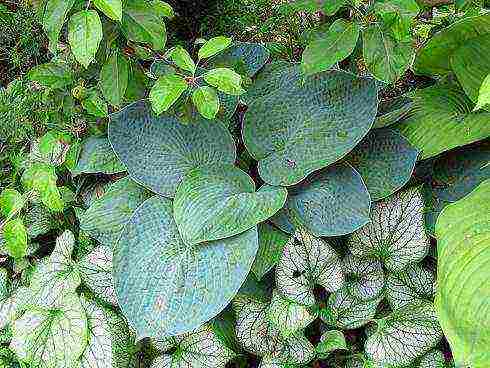
Big-daddy
Secondly, the hosta is distinguished by an amazing frost resistance, which allows it to be grown in the northernmost regions of the region, or even further. It should be emphasized here that we are talking about the frost resistance of the plant as a whole, because the leaves frozen from the first frost are not a cause for concern, this is a normal course of events.
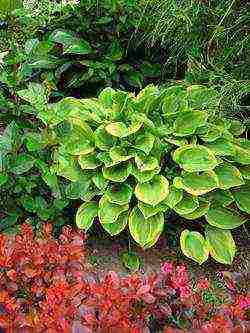 Thirdly, it is unusually shade-tolerant, so it can grow in the most inconvenient and poorly lit areas. Moreover, using the same varieties in conditions of different illumination, you can get leaves of different colors.
Thirdly, it is unusually shade-tolerant, so it can grow in the most inconvenient and poorly lit areas. Moreover, using the same varieties in conditions of different illumination, you can get leaves of different colors.
Fourthly, hosts are able to grow even in extreme conditions, for example, in areas flooded by spring waters or on saline soils.
NEW AND FAVORITES
Although we consider the hostu to be an ornamental deciduous plant, flower arrows appear on it in due time, bearing rather large bell-shaped flowers in the upper part. Their color does not differ in variety and fits into the range from pure white to amethyst-violet. Sometimes, for example, in the Tall Boy or Krossa Regal varieties, the peduncles grow to a height of one and a half meters, quite significantly changing the appearance of the plant. A small group of varieties with a lineage from the hosta plantain has a rather strong and pleasant aroma.
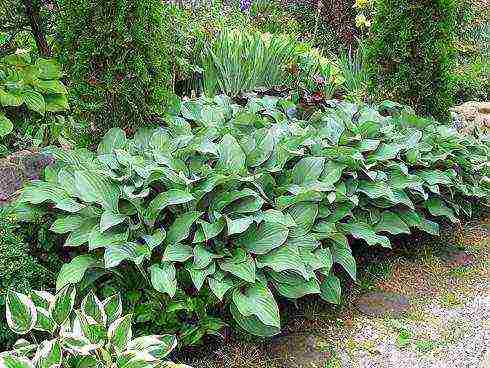
Krossa regal
And yet, above all, we value the hosta for the exceptional variety of its leaves. Look even at a few photos: what a rich palette of colors - blue, green, yellow and white colors in all kinds of combinations! Add here the variability of the texture of the sheet itself - it can be matte or shiny, leathery or smooth, or even completely corrugated, like a waffle towel. The shape of the leaf is also different: lanceolate (like in the Stiletto variety) or almost round (like in Pizzazz), oval-elongated (like in Antioch) or wide (like in Frances Williams).
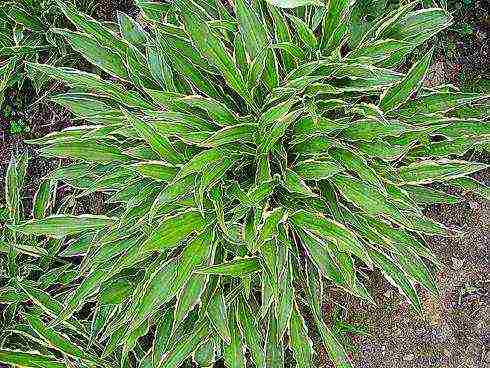
Stiletto
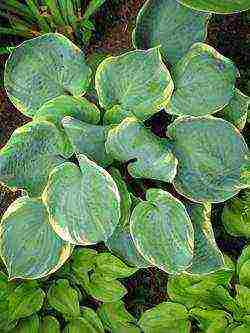
Modern breeders are trying to surprise us with more and more new varieties with even more amazing qualities. More recently, a hosta appeared, growing from an adult, this year the appearance of the first four-color hosta has already been announced.
Even if you are not chasing the hottest new products, there is a wide selection of excellent varieties that have proven themselves in the past that can brighten any site. Low and medium single-color host varieties can be successfully used to frame the edges of paths and flower beds, to create borders (for example, Blue Cadet, Pacific Blue Edger, Halcyon). Tall hosts can serve as a backdrop for flower beds, supporting other plants with strong leaves (Krossa Regal, Regal Splendor). Low monochromatic green hosts are needed to separate color spots in a flower garden, as well as for a neutral background, if you need to emphasize the features of another plant, especially variegated. Hosts with blue (Blue Angel, Big Daddy) or yellow (August Moon, Sum and Substanse, Gold Standard) leaves are simply irreplaceable when creating large color spots.
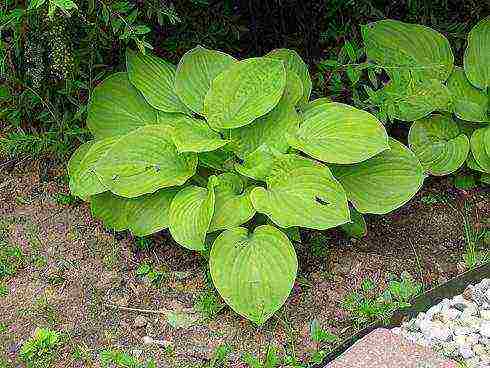
August moon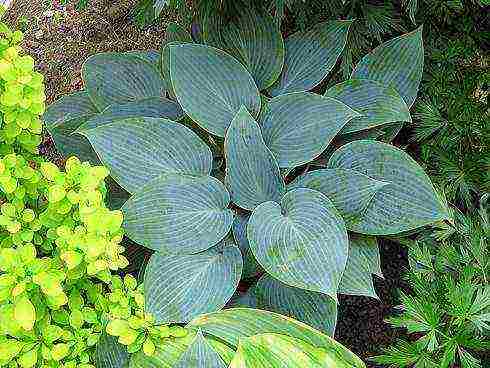
Halcyon
Hosts feel good, being planted on alpine slides and in the coastal area of the reservoir. They are indispensable for creating Japanese and Chinese gardens with their streams and rounded shapes. Here they can be used together with the constant companions - ferns and grasses. The play on the contrast of the shapes of the leaves will further emphasize the beauty of each plant.
Separately, it is worth noting the possibility of using the host as container plants, which make it possible to change the arrangement, each time creating something new and unique.Dedicated from the environment, raised above the ground, they allow you to see yourself even better, to see what is usually not visible upon a cursory examination.
|
HOSTS OF THE YEAR - the most fashionable hosts Since 1996, the American Host Society of America has selected the most widely recognized variety every year. Here they are, the favorites of American gardeners: 1996 - So Sweet. A variety with shiny oval-pointed green leaves with a wide creamy border. The size of the sheet is 11x18 cm, the flowers are white, fragrant. M 1997 - Patriot. One of the most contrasting varieties in color: the dark green middle of the leaf is surrounded by a large-toothed pure white border. Sheet dimensions 13x17 cm. Withstands direct sunlight. M 1998 - Fragrant Bouquet. The leaves are round-heart-shaped, light lemon-yellow in color with an uneven cream border, 15x20 cm in size. The name (English Fragrant Bouquet) reflects the peculiarity of the variety - white flowers exude a pleasant delicate aroma. Another advantage is slug resistance. M
1999 - Paul's Glory. The wrinkled leaves of this variety show a blue color (from the parent hosta Siebold) with a yellow middle, their size is 12x20 cm.During the season, the color changes: the middle becomes almost white, and the border is blue-green. M 2000 - Sagae. Young leaves are bright green with a dark yellow border; as they grow, they turn into silvery-bluish with a pale yellow border. The size of the leaves is 25x35 cm, they are located on the bush in the form of a vase. L 2001 - June. When planted in a sunny place, it produces amazing heart-shaped golden-yellow leaves with a blue edge, measuring 10x16 cm. In shady places, the color will be more intense, although not so bright. The bush is symmetrical, does not fall apart. S - M 2002 - Guacamole. Large, almost round, shiny green leaves with a bright yellow center, leaf size 21x28 cm. It needs light, but when exposed to direct sunlight, the leaf becomes whitish. Large fragrant flowers. M - L. 2003 - Regal Splendor. In Russian translation, the name means Royal splendor. Really powerful vase-like host. Strong pointed grayish-blue leaves with a cream border, 18x28 cm, resistant to bright sun, successfully resist slugs and snails. Powerful peduncles up to 1.5 meters in height. L 2004 - Sum and Substance. One of the most popular varieties, whose beauty is best shown when grown in sunny areas. Huge leaves of a chartreuse (yellow-green) color 38x45 cm in size gradually turn into golden yellow. The plant is decorated with lavender flowers, which contrast favorably with the leaves. L 2005 - Striptease. Oval-elongated leaves measuring 16x21 cm. One of the first tricolor varieties: the chartreuse center of the leaf is fenced off from the rich green border by a narrow strip of white color (strip). M 2006 - Stained Glass. Wide oval matte golden yellow leaves with an irregular wide dark green border, 18x26 cm in size. Needs a sufficiently light place. M - L 2007 - Paradigm. The wide, initially chartreuse-green leaves turn into yellow, retaining a wide bluish-green stripe, the size of the leaves is 22x27 cm. Two to three hours of sun a day is enough for the color to develop. Growing rapidly. The variety is resistant to snails. M - L 2008 - Blue Mouse Ears. Miniature blue host. The leaves are almost round, 5x6 cm, very thick and resilient. Prefers diffused light. Ideal plant for rocky slides and gardens as well as containers. Min 2009 - Earth Angel. A wonderful variety with thick bluish-green leaves, surrounded by a wide irregular yellow border, set in flashes to the middle of the leaf, size 23x30 cm. Requires several hours of sun a day. Excellent variety for tapeworm for many years. VL 2010 - First Frost. During the season, the blue color of medium-sized leaves changes to green, and the initially creamy yellow border turns white. The size of the leaves is 11x17 cm. It is resistant to slugs and snails. S - M |
Host size classification:
- D (Dwarf - dwarf): up to 13 sq. cm
- Min (Miniature - miniature): 13 - 36 sq. cm
- S (Small - small): 36 - 160 sq. cm
- M (Medium): 160 - 530 sq. cm
- L (Large): 530 - 900 sq. cm
- G (VL) Giant (Very Large): over 900 sq. cm
Prepared by Sergey TARNUEV
Nature gave us more than 40 types of host... On their basis, breeders bred many varieties that adorn gardens in many countries, although the host is the Far East, China, and Japan.
Gardeners became interested in the beautiful-leaved Far East in the 18th century, when the Austrian N. Khost told the world about him, and a little later the German G. Funke. This is why this plant is sometimes called funkia.
In one place, hosts can grow up to 20 years, becoming more and more beautiful every year. A bush of large, juicy, with a contrasting edging of leaves makes an indelible impression. He is able to add sophistication to even the most unpretentious flower garden.
Scientists attributed the hosta to the Liliaceae flower family. This perennial plant has a bush with a height of 15 to 120 cm, a compact rhizome and shortened stems, from which petiolate leaves extend. Their shape can be from narrow lanceolate to broadly ovate.
Leaves - the main decoration of this shade-tolerant plant. The color of the leaves is varied: dark green, bluish-gray, yellow-golden or variegated with a white pattern, with a contrasting border.
There are hosta varieties with both large and very small leaves, the size of which is slightly more than a 50-kopeck coin. In shape, they can be round, oval, heart-shaped and even with a wavy edge. Their color also pleases - green, blue, yellowish-green, as well as with variegated strokes or a white, yellowish border.
In some hosta varieties, leaf stalks look very impressive. So, the variety Red Oktober (Red October, Red October) they are reddish.
There are varieties that change the color of the leaves during the summer. Most often, this is the "sin" of varieties with a golden color, which by autumn becomes less bright. And it happens the other way around, for example, in the August Moon variety (photo in the article below, in the descriptions of the varieties), only by August does the golden color of the leaves appear.
The varieties with blue and green leaves are more stable. Hosts with wrinkled (waffle) leaves look very unusual.
Although the hostu is considered an ornamental deciduous plant, it has very graceful and bell flowers... Lilac, pink, lilac, white or lavender flowers are collected in a graceful cluster, crowning flower stalks that proudly rise above the luscious foliage.
The flowering time varies greatly from cultivar to cultivar. The early varieties bloom in July, while the later ones can delight until October. Some hosta varieties (for example, Aphrodite Aphrodite) have a pleasant aroma of flowers. True, in the middle lane, this variety does not bloom every year.
Let's introduce you with the most decorative types of hosts, and then a description of some of the most curious varieties will follow.
Host types
| White-bordered (Hosta albo-marginata) Hosts of this species are medium-sized, with large green leaves (length 14 cm, width up to 10 cm), decorated with a narrow white border. On peduncles 30 cm high, lilac or white flowers are formed (depending on the variety). |
| Bloated (Hosta ventricosa) Large plant with heart-shaped leaves (up to 25 cm long, 20 cm wide) with a pointed tip. Peduncles up to 1 meter high are crowned with purple flowers. |
| Wavy (Hosta undulata) Leaves are oblong (length 20 cm, width 13 cm), wavy along the edge. There are forms with a green color, with a white border, white with a green border. Peduncles up to 80 cm high are crowned with purple flowers. |
| Decorative (Hosta decorata) Bush up to 45 cm high, up to 55 cm in diameter. Leaves (length up to 15 cm, width up to 8 cm) with a sharp tip, dark green with a white border. Peduncles about half a meter high with lavender flowers. |
| Siebold (Hosta sieboldiana) The leaves are large (up to 36 cm long, 25 cm wide) with a heart-shaped base, wrinkled, dense, gray in color. Peduncles up to 40 cm high are decorated with lavender flowers. Many varieties with blue leaf color have been created with the participation of this hosta species. |
| Curly (Hosta crispula) It grows slowly, but over time forms a powerful bush. Leaves with a heart-shaped base, oblong (length up to 16 cm, width up to 10 cm), green with a narrow white border. Peduncles up to 80 cm high are decorated with lavender flowers. |
| Lanceolate (Hosta lancifolia) The plant is compact, bush up to 40 cm high and up to 50 cm in diameter. The leaves are narrow, up to 17 cm long. Peduncles up to 50 cm high are decorated with purple flowers. |
| Plantain (Hosta plantaginea) Large leaves (length 30 cm, width up to 15 cm) resemble the well-known plantain in shape. They are bright green, shiny. Peduncles up to 60 cm high are crowned with white, very fragrant flowers. On the basis of this species, garden forms with double fragrant flowers have been created. |
| Straight-leaved (Hosta rectifolia) A large plant, oblong dark green leaves (length up to 20 cm, width up to 10 cm) directed upwards. Peduncles up to 80 cm high are decorated with purple flowers. |
Description of the best hosta varieties
Hosta has long been considered a garden favorite, so all hosta varieties simply cannot be listed (there are several thousand of them), and new ones appear every year. Unfortunately, many varieties are very difficult to distinguish from each other, although there are some real highlights.
The choice of a variety directly depends on your taste. The most resistant and durable varieties are tall and medium-sized. Dwarf forms are much more capricious, they require more careful care.
Among the blue host high grades are very effective. You can choose a variety with wrinkled leaves - Big Daddy (Big Daddy) and with a smooth leaf surface - Elegans (Elegans).
Among the medium-sized varieties without competition, Halcyon, Blue Boy, Love Pat, pictured at the very beginning of the article, this hosta can grow under the bright sun.
Of the more compact ones, be sure to plant Blue Moon and Blue Cadet.
Hosts with green leaves should also grow in your garden, because it is they who help to make the transition between brightly colored varieties smoother. Hosta plantain (with pale green leaves and white fragrant flowers) and lanceolate are very popular.
An interesting miniature variety Teaspoon (Teaspoon), which, unlike most dwarfs, is very stable.
Yellow-leaved host August Moon stands out - a large plant that changes the color of leaves from yellowish-greenish to almost lemon by the end of summer. Lemon Lime has lemon-colored leaves.
Always look spectacular varieties with a border on the leaves... Alex Summers has a creamy white border, Antioch has a yellowish border and then turns white.
Against a dark green background, the Patriot variety has a particularly contrasting white border. The medium-sized variety Frances Williams is distinguished by a rather wide, but blurred yellowish border against the background of bluish-green wrinkled leaves.
Golden Tiara (Golden Tiara) - a miniature plant with a clear golden border around the edge of the leaf.
Hosts with a contrasting middle of the leaf attract particular attention. Most often these are varieties with a white or golden center and a green edge. A great example is Inniswood (photo above) with a narrow green border and a bright yellow center.

